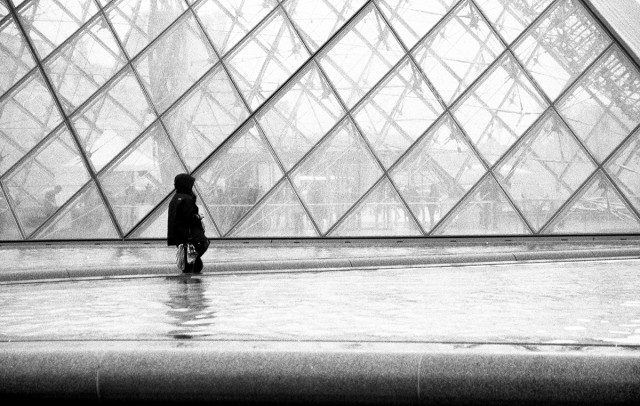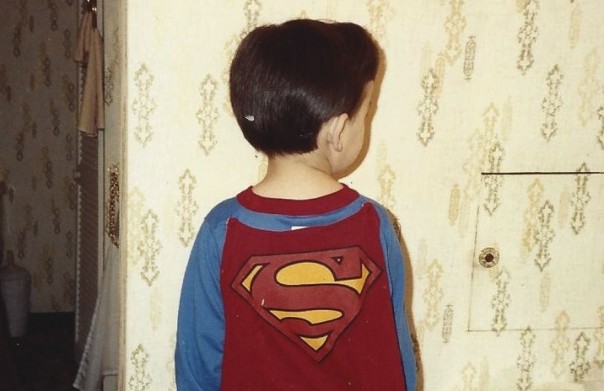I've been to the school nurse many times as a kid. On most of those occasions, I simply wanted to get out of class. Once, I was there to get a physical, and I had to stand in my underwear with a bunch of other boys in their underwear. I didn't like that. A year and a half ago, a full-fledged adult, I found myself standing in the doorway of the school nurse yet again. "Hi. I need to lie down."
The nurse lifted her eyes up from her computer screen, and when she saw that it was me, she rose to her feet, pointed to the bed in the back of the room and said, "Okay. How about right here?"
I made my way over to the low bed and slowly slid onto it. My whole body was tense. My forehead was gleaming with sweat. My heart was beating hard and fast. My teeth ground into each other as I tried to control my breathing.
She asked me what was wrong. I explained that I had been standing guard at an assembly for our middle school students when I suddenly felt like I was going to faint. I told her about my heart. I told her about my trouble breathing.
I didn't tell her I had slid out of the assembly and gone straight to the bathroom, where I leaned against the wall and tried to fight for control over my body for several minutes before I decided to come see her. I became convinced I would pass out. Since I had locked myself in the single-person faculty bathroom, the potential scenarios concerned me--I could have hit my head off the sink and bled out. I could have fallen face-first into the toilet and had to explain to my students why Mr. Heggie looked like he went for a swim. (Also, in that scenario, I would have thrown up after I regained consciousness and realized where my head had been sitting.) Or, simply, I would have been sprawled out on the floor, MIA to everyone else for who knows how long.
It was fear--the fear of passing out in front of my students, of passing out in the bathroom, or of the faint possibility that something critical was wrong with me--that led me to her office and had me confessing even the little bit of information I had conceded to her. And it was fear that was having its way with my body.
She said to me, "It sounds like it might be an anxiety attack."
"Oh. Really?" I tried to fake that I was surprised by her suggestion, but I already knew what it was.
The first attack had come earlier that year. It was on my morning drive to work. My chest felt like it had collapsed on me. The experience was so bizarre and foreign to me, I thought I was having a heart attack. I pulled the car over, and in the darkness of that pre-dawn morning, bewildered and full of fear, I slumped over my steering wheel and gasped for breath. It wasn't the last time I'd have to pull the car over to fight for calm, to put air in my lungs.
The attacks woke me up at night, too. Those were the worst. Being woken by an anxiety attack might as well be the same as being woken by a real person trying to strangle me. Yanked out of my dreams, I would be disoriented, panicked, and sometimes it was hard to tell what was reality and what wasn't. With a jolt, I'd find myself in darkness, unable to breathe, covered in sweat, grabbing hold of anything to root myself in reality again--my hair, a pillow, the blanket, the headboard.
In the span of about a year, I had a dozen or more attacks, the last one landing me in that nurse's office. Lying on the tiny, hard bed, I couldn't help but feel a little foolish, like I was back in third grade again.
Even though I'm far removed from my last one, I hate talking about my experience with anxiety attacks. I hate the idea of people knowing about this part of my past. Here's why:
People like me aren't supposed to have anxiety attacks. Let me summarize my views about them before I had my first one: Weak people have anxiety. Weak people have anxiety attacks. Strong people don't have anxiety or anxiety attacks. I am a strong a person; therefore, anxiety and anxiety attacks will never be my problem.
Anxiety is for weak people, and I'm not one of them.
Before I ever experienced an attack, I had zero empathy for people with anxiety. None. I couldn't relate. I never considered myself to be someone who struggled with any level of anxiety. I'd never been the type to worry or sweat the small stuff or fixate on a problem.
Until, that is, I found myself in the fight of my life for my marriage--a losing battle.
Every day, I thought about it. Every day, I thought about what was wrong. Every day, I fought the frustration that I couldn't seem to fix things. Every day, I faced the possibility of the end. Every day, I battled with the lack of control I seemed to have over the situation. Like an eclipse, it seemed to slide between me and the sun--my world became strangely dark.
I was running low on everything--sleep, energy, self-confidence, hope.
In other words, I was cooking up a perfect recipe for anxiety.
For a while, I was ashamed of those anxiety attacks. There was only one person who knew how rattled I was. It was all very hush-hush. I wanted so badly to maintain a brave face. I would have loved for people to see me only through idealistic, machismo-tinted lenses: I climb mountains. I scale buildings. I jump off cliffs. I explore caves. I go camping in the woods by myself. I don't fear heights. I don't always wash my vegetables. I don't need a night light. (Yeah, I have one in my room, but I don't use it--it's just for show.)
Paul Freaking Heggie does not have, should not have, can not have anxiety attacks. That doesn't happen to people like me.
Even with the weight of what I was facing at that time, I thought I could handle it all. I was David, and I looked at my burdens like they were Goliath. Sure, Goliath's bigger than me, but I'm going to drop him to the ground and take off his head. That's bravery. That's strength. That's me.
But try as I might to fight them, when those anxiety attacks hit me, they brought me to my knees. You can't "beat" an anxiety attack. I learned you can't even really prevent one. Once it strikes, there's no fighting it. You can only let it ride out in calm surrender. Once I had experienced a few, I started worrying about when the next one would come--and where. Rarely in my life have I felt that weak and powerless. That's not the David and Goliath story I was going for.
Those attacks feel like ages ago now. I've had a bit of time and distance from those experiences, and my perspective on anxiety has shifted since then.
What if being strong doesn't mean that we slay all of our Goliaths? What if being brave doesn't mean that we always conquer all of our fears? What if we're not meant to win every single battle?
I think being strong and being brave is simply showing up for the fight.
There are so many people for whom anxiety is a Goliath they can't fight against and win by themselves. They need backup. They need the support of family and friends. Some need the help of doctors, therapists, and medicine.
There are people who think that because anxiety beats them down sometimes, they're not strong. There are people who think that because they wrestle with anxiety, they're not brave.
I don't think that's true.
I think you're strong--you wake up every day and continue to fight. That's no small feat. Some days you win the battle, some days you don't, but that's true for even the strongest of people.
I think you're brave--you have the courage to keep going despite your anxiety. Plenty of brave people have fallen. Plenty of brave people have lost. All brave people feel fear. The bravest people are the ones who get up again and walk back onto the battlefield knowing what they have to face. That's you.
Those of who us who are strong, who are brave, we don't win every time. We simply keep showing up to the fight. We keep holding on to hope. We persevere through the battles.
***
Last week, I paid another visit to the nurse's office. This time, I had a splinter in my finger that needed to be removed. She sat me down next to her desk, told me I wasn't allowed to look, and went to work. Guys, I didn't even flinch or shed a tear.
Brave, right?

 photo credit:
photo credit: 